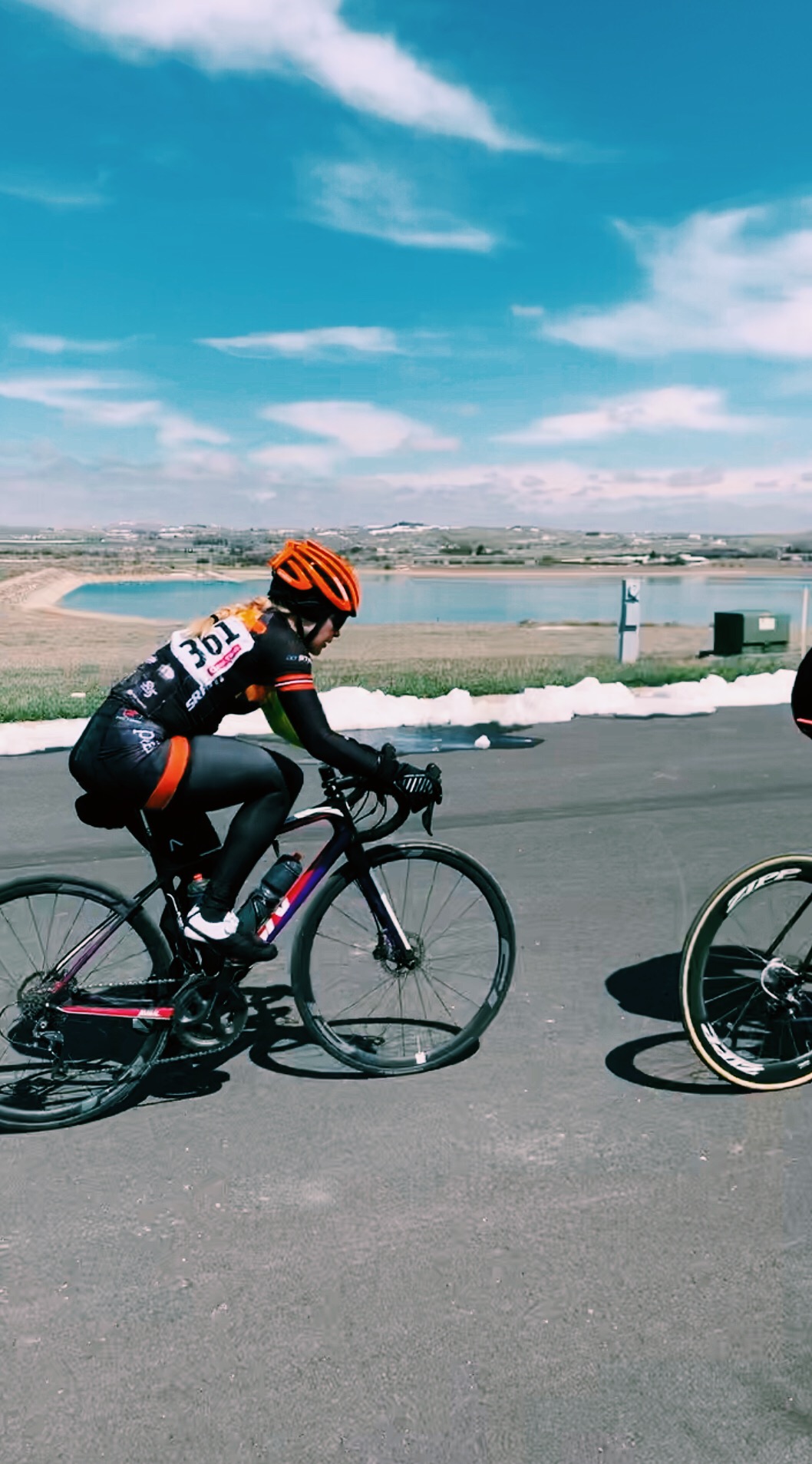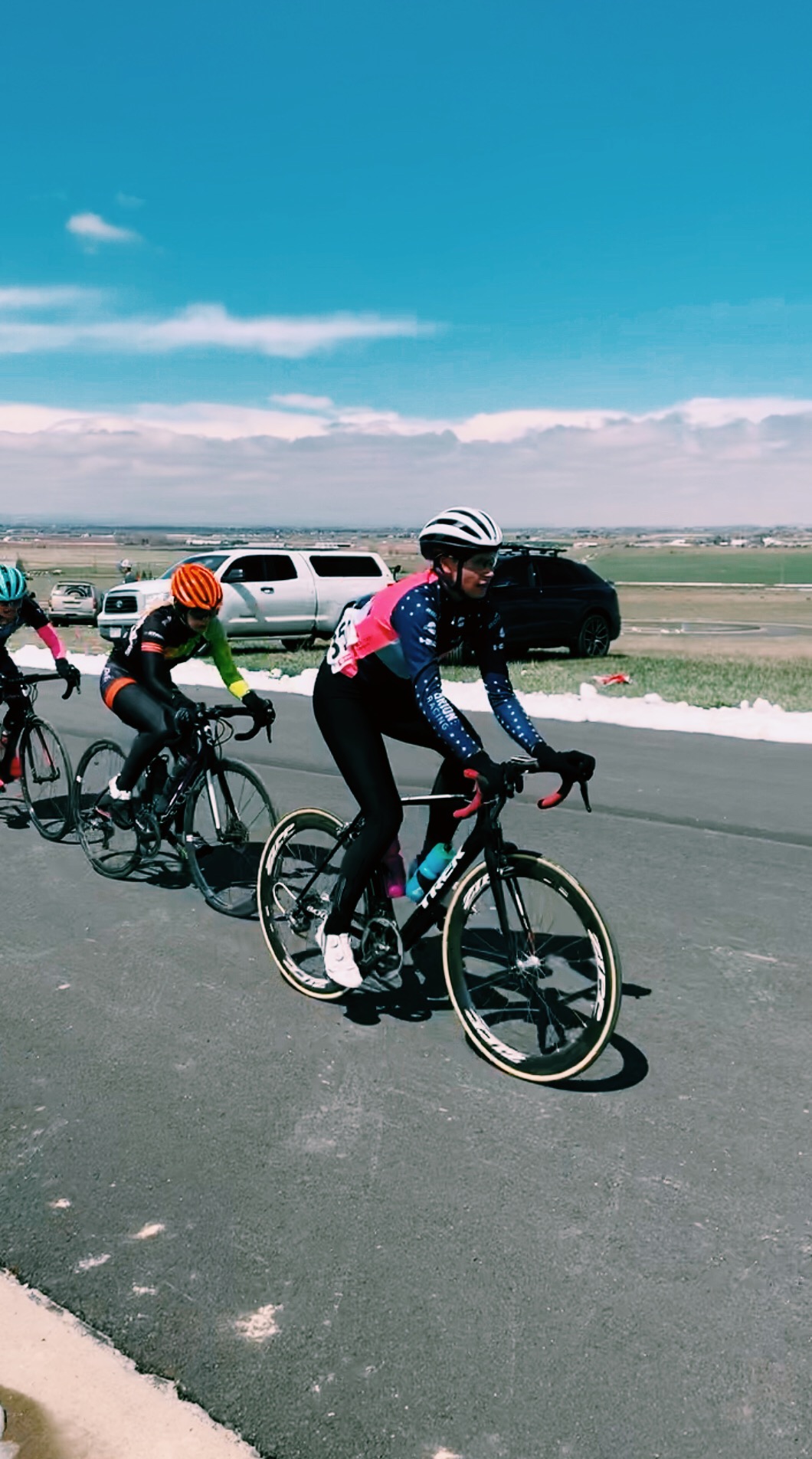Regretful thoughts sprinkled down. It was a balmy 30F outside as I packed my six water bottles, gear, and bike. I stopped to take a picture of the graveyard across the street as snowflakes floated around. Why TF am I racing today? I thought to myself.
I texted Anna my plan for the race. I also might have said, “I wish they’d cancel the race.” I wasn’t interested in hardening up. I wanted to sprawl across the couch, under my purple blanket, and rewatch Game of Thrones. That sounded like a solid Saturday.
Instead, I turned on Maps and my Wonder Woman & Thunder Spotify playlist and started the long haul up to Fort Collins. I drove through four different seasons over a span of 70 miles and questioned my sanity.
We all do it, measure each other up. Any time I saw a woman walking around as I sat in my warm car eating a peanut butter and banana wrap, I’d try to guess what team she was on. When I realized who any of them were with, especially if they were on a prominent team, I’d usually second-guess my abilities. I assumed I’d finish middle of the pack.
I don’t know why that’s my default.
It’s never, I’ll probably end up 1st, it’s usually, Shit, I’ll be lucky if I don’t come in last.

I know I need to do better about my automatic thoughts and I’m working on it. It’s a lot like yoga, in that, it’s a practice. That’s what the yogis say at least. I don’t think I’m going to be perfect at mindfulness one day. I can get better, but there will always be thoughts that pop into my head. The simplest, yet hardest thing to do when these thoughts stampede into our minds is to let them keep stampeding.
We lined up before the whistle and I looked around. I measured myself up against the other women, predetermining where I’d end up at the finish, as if I was some kind of fortune teller. And that’s where I needed to let my thoughts keep on stampeding by. Instead, and like the ant infestation at my backdoor in our townhome, it festered and grew. I assumed that because I was racing against Pros, 1’s and 2’s, that I wasn’t capable of keeping up with them.
It’s unhelpful thoughts like this that ruin a race or a day. And do you know what a thought is? I didn’t until I started researching it. A thought is pretty much electro-chemical reactions. In our brains, we have billions of nerve cells connected to each other through synapses. These connections transmit a signal per second, on average. This somehow produces a thought.
Because I can’t word it any better:
“When you read these words, for example, the photons associated with the patterns of the letters hit your retina, and their energy triggers an electrical signal in the light-detecting cells there. That electrical signal propagates like a wave along the long threads called axons that are part of the connections between neurons. When the signal reaches the end of an axon, it causes the release of chemical neurotransmitters into the synapse, a chemical junction between the axon tip and target neurons. A target neuron responds with its own electrical signal, which, in turn, spreads to other neurons. Within a few hundred milliseconds, the signal has spread to billions of neurons in several dozen interconnected areas of your brain and you have perceived these words. (All that and you probably didn’t even break a sweat.)” https://engineering.mit.edu/engage/ask-an-engineer/what-are-thoughts-made-of/
So, basically, a lot of shit is going on in our brains all the time. We don’t really know what’s the deal with thoughts. They’re usually sparked by something that you see, taste, touch, or smell.

But I’m (and a ton of other people are) here to tell you that you are not your thoughts. I’m here to tell myself that, too. What does that even me? Surely, if I’m thinking these thoughts, these thoughts are me. No, they’re not. You can be separate from your mind.
Our brains observe the outside, but it’s our mind that feels compelled to narrate what we’re observing. You can’t just see the cyclist taking off the front and being unable to stay on their wheel. Your mind adds commentary to that like, “Catch up,” or “I’m too slow to stay on their wheel,” or “don’t get dropped.”
It’s not our thoughts that make us miserable or happy or insert-an-emotion-here, it’s our attachment and belief of the thoughts, it’s our acceptance of our mind’s narrative.
Byron Katie said, “When we believe our thoughts instead of what is really true for us, we experience the kinds of emotional distress that we call suffering. Suffering is a natural alarm, warning us that we’re attaching to a thought; when we don’t listen, we come to accept this suffering as an inevitable part of life. It’s not.”
Thousands of thoughts fly through our minds daily. Literally thousands. Most of them continue to buzz on by, but some we attach ourselves to like a fly to sticky paper. And we’re stuck there, desperately trying to tug away.
As we hammered up the Cobb Lake hill for the 3rd time with two more laps to go, I thought to myself: I’m not going to make it. I’m going to get dropped. And then I remembered all the gurus I’ve read in the past and asked myself, “Does this thought help or hurt me?” I’m sure it wasn’t that direct or long seeing as I was wrestling between negative thoughts and not getting dropped. It was likely, “stop it.”
Becoming aware of our automatic thoughts is the first step to being able to prevent attaching to them.
Second step: questioning them. When I realize I’m ruminating on a thought (“don’t get dropped” or “why did this happen to me?”) and I have the awareness to stop for a moment, I ask myself that line: Does this thought help or hinder me? Nine times out of ten, it hurts me. When I decide that, I focus on something else. A few minutes later, another thought will pop up (“I’m not going to win the sprint finish”). If I catch myself, I’ll either ask again, “does this thought help or hinder me?” or in the case of the race, I’ll focus on my breath.

Returning to mindfulness like focusing on the present and your current surrounds can help silence that voice in your head. Your mind that’s obliged to narrate every little thing that goes on in your life. This is a work in progress. It’ll always be work. It’ll never not be easy. Our minds are truly powerful, but we don’t have to succumb to their narrations, their voices.
Our thoughts aren’t real. They’re just what our minds are making up.
As we sprinted up the final hill toward the end of the race, I focused on the two other women next to me. My brain was running a mile a minute, but I watched them pedal. I watched for gear shifts. I watched for any out of the saddle movements. I was keenly aware of everything going on around me as my brain chattered away.
One of the women sprinted off and I followed. My legs howled. My chest burned. My mind was finally focused on one thing: outsprint her. I didn’t focus on my lack of sprinting strength. Instead, I put my mind toward my legs and don’t them to push. Push until the end. I saw my mom and sister. I saw the white line. I saw the ref.
She out-sprinted me. I came in 9th. We don’t have to let our thoughts determine our reality.
Thanks to my patrons who make my writing possible. You can become part of our club here:

